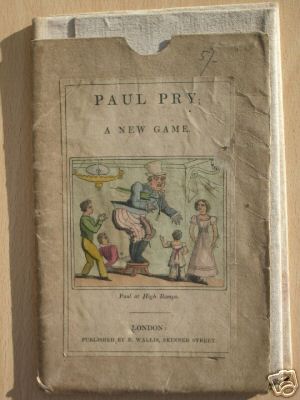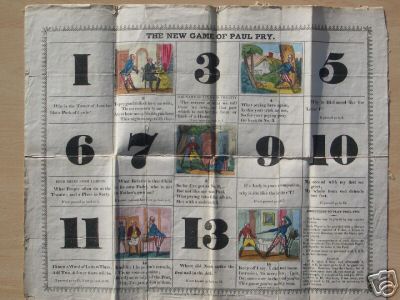Sunday, December 31, 2006
War is Swell
Stuff (Cape, April) recreates the adolescent years of Martin Rowson, who looks back with a near-photographic recall, as befits an artist, at the house he grew up in in the 1960s and 1970s.... Another spin on the theme of the Seventies childhood comes from Harry Pearson. In Achtung Schweinehund! A Boy's Own Story of Imaginary Combat (Little, Brown, Jan) he recollects long hours spent playing wargames, manoeuvring tiny soldiers around his bedroom floor and painting Airfix models.
A fascinating variant of the latter's genre is by Warhol-colleague William Anthony in his War is Swell: A Kid's Idiotic View of World War II. I first came across it at the inimitable Quimby's in Chicago, and this NY Press review by John Strasbaugh in 2000 summed it up best:
His anatomically incorrect figures–heads like lima beans, torsos like potatoes, crooked tits and wrong-way-bending limbs–are the perfectly inept illustrations for his boy’s own version of the war, all gleefully ignorant jingoism, racism and just plain doofism.One of the first things you notice is that it’s not all that different from the view of war presented in Saving Private Ryan or most any other war movie. Indeed, there are panoramic battle scenes here every bit as epic in sweep as Spielberg’s invasion of Normandy. It makes you think maybe all war stories are told by boys, to boys (with a few notable exceptions like The Thin Red Line).
Not, I’d guess, that Anthony has so lofty an intent in mind. The book’s too funny, the drawings much too likably dork. (Warhol once said Anthony’s earlier illustrated rendition of Bible stories was the only version of the Bible he could read.) "The Japs, they started it by bombing Pearl Harbor," Anthony sagely relates. We learn that "Hitler’s girlfriend was Eva Braun. Hitler didn’t know it, but she would lock herself in her room and boogie to jazz records," and that "Kraut officers were all born with big dueling scars on their faces. Their favorite word was: SCHWEIN," and that "Whenever Hitler conquered a new country, he would do a dance."
In the end, though, justice prevails: "Hitler had Eva Braun go and poison herself in their bunker. Then Hitler poisoned and hung and shot himself. Then just to be sure, he burned the bodies."
The cover alone says more than I could possibly add:

Dickens on the Big Screen
Macdonnell Rare Books has this curious item listed in their catalogue:
Dickens, Charles. THREE-PANEL ROOM SCREEN. [ca. 1890-1910]
This reading screen (or rather large fire-place screen, or rather small room divider) measures approximately five feet ten inches tall, each panel measuring twenty inches wide, connected by brass hinges. Each panel is covered on both sides with identical buff color wall paper printed in blue-green ink, over wooden panels, with muslin piping held by upholstery tacks, depicting the major characters and scenes from Dickens' novels: David Copperfield, Aunt Betsy & Mr. Dick; Dolly Varden; Mr. Pecksniff, Tom Pinch & Mark Tapley; Barnaby Rudge; The Blue Dragon; The Bull Inn, Holborn; Mr. McCawber, Dan'l Peggotty & Uriah Heap; Mr. Bumble; Mr. Pickwick & His Friends; The Old Curiosity Shop; Peggotty's House; and Sairey Gamp.... A wonderful artifact, of striking appearance, ideal for the library. Nobody can see what you're doing behind this screen, and you can do things you wouldn't dream of doing behind, say, a Thackeray screen...
USD $1650.00
Certainly it's more fun than anything you'd do behind an Ernest Hemingway Screen....
Monday, December 25, 2006
Yes, Notes on the State of Virginia....
Saturday, December 23, 2006
Really Slow Food
Invariably these stories included the magic phrase: "they discovered it was still edible."
Every time I saw one of these, I'd photocopy it, and after four or five years of this I had me one wacky-ass article. Oh, and some great e-mails helped:
In 1997 Tony Rogers, a former employee at a Wisconsin-based chemical company, cleaned out his office desk to discover a Dolly Madison apple pie he'd purchased at a gas station 8 years earlier. Rogers' fruit pie autopsy, immortalized in photographs on his web site, has received some 245,000 visitors, thanks in no small part to his deliberately ludicrous correspondence with a hapless Interstate Bakeries customer care representative. But his exploits did not quite end there.Incidentally, here's Tony's 8-year old pie side-by-side with a new Dolly Madison pie:
"Before I wrapped it all up," he says, "I did pick up a piece of the pie, and I actually ate some of it. My immediate reaction was that it was somewhat caramelized and somewhat chewy. But... it was the same taste.... I honestly think that if my pie was put back on a shelf in a gas station, someone would purchase it and they would consume it and not ask any questions."

Can you guess which is the safe one to eat? Well... both, apparently, since Tony told me he didn't get sick.
One of the strangest parts of my research came up when I repeatedly called the Prince of Wales's Own Regiment of Yorkshire Museum to confirm a rumor that they had a still-edible chocolate ration from the Boer War. Bear in mind that, thanks to the time difference, I was having to call at like 2 am my time -- and I kept getting volunteer docents picking up who must have thought that I was out of my mind.
But -- guess what -- their curator eventually discovered the rumor was true.
Better yet: as I was tracking that rumor down, I discovered an identical New Year's 1900 ration getting auctioned off on eBay under the title Queen Victoria Boer War Gift Tin With Contents.
Ever wondered what a 106 year-old Cadbury bar looks like? Behold!....


If my rivals in the 106-year old candy trade hadn't bid it up to $270, I'd have bought it myself. But.... would I have sampled it?
Well, funny you should ask: because when I looked just now, there's another 1900 chocolate ration in its final hours on eBay. So maybe at last I'll get to sample a bit of th....

Oh ... eh, maybe not.
Monday, December 18, 2006
Lunacy
I got my start as a writer with a McSweeney's article (excerpted here at NPR) on this 1835 newspaper hoax, which had New Yorkers convinced for a brief but glorious time that there was a race of man-bats living in ruby pyramids on the moon.

Sunday, December 17, 2006
Lost!
Check this one out:
I cannot possibly end this post without also noting the Observer's listing of the Le Petomane, "A forgotten masterpiece short starring Leonard Rossiter as Joseph Pujol in the true story of a man who had an elastic anus."32 The Day The Earth Caught Fire
A brilliant London film, a great journalist movie and a classic example of period sci-fi cinema. Leo McKern is thrilling as the Daily Express writer (it was shot in the paper's old Fleet St HQ) who has discovered global warming - Val Guest's film seems more prescient every year. Also, there's an early cameo from Michael Caine as a policeman ushering crowds out of the city, a scene eerily reflected in Alfonso Cuaron's Children of Men this year.
Val Guest, 1961
Wouldn't that describe an entire category of movies?
Arise, Kircher Society...
The proceedings will include a demonstration of the "universal musical language" of Solresol....

.... And yes, yours truly will indeed be, ahem, on hand for it.
Sunday, December 10, 2006
A Staple of My Diet
Redstone’s Christmas 2006 offering, Dr Clock’s Handbook, is an elegant hardback celebrating the absurd. Open it, and you might find extracts from a skew-whiff English phrasebook, compiled by literal translations of phrases in another language: examples include “Have you say that?”, “He does me some kicks”, and “I have mind to vomit”. Turn over, and you come across a picture of mashed potato with (possibly) an adornment of peas....A book after my own heart. Read on --(The Times of London)
....Next to that is David Shrigley’s London Tube map: an exact reproduction of the official one, except that in place of the grid is a jumble of spirals.
Another illustration is simply:

Saturday, December 09, 2006
In Praise of Olive

One of the hardest things in art, outside of creating it, is to be that very first person who looks at an unknown and his or her work and says: I like it. Any idiot can second the motion. But to look at an unknown and say, "You, yes you, you are worthy"—that is different. That means taking a risk, to say yes where probably dozens have already said no.... [Yet] In an industry that could be numerically defined by how much it rejects, the first agency in Manhattan was itself a flop. In the 1870s, famed stage actress and author Olive Logan began an agency with her author husband, William Wirt Sikes—but it failed because the manuscripts were terrible. Logan and Sikes were less gatekeepers than a representation service, and publishers had no great use for that. Logan, Manhattan's first modern literary agent, died in an asylum, destitute and demented—thus setting a time-honored pattern for all her other authors to follow.
To be fair, Logan and Sikes had no business model to follow. Nobody imagined publishers ceding their role of screening unsolicited manuscripts.... But now many publishers will not even look at this manila-enveloped tide of humanity: They happily leave that drudgery to agents. Publishers, to their great relief, no longer have to be the first to say: I like it.
It's probably worth pointing out that Logan also authored a number of books and wrote for Harper's, so actually she's an even rarer creature: the writer/agent. One of her books -- a memoir of stage life -- turned up on eBay a couple days ago and is already getting bids.

Say, here's a question: has anyone ever written a history of literary agents? Some scholar should. I'd certainly read it....
Monday, December 04, 2006
Life Before Monopoly




I'd have bid for it myself, if I could only convince my family that I really need a $500 board game.
One curious aspect of this game: "Paul Pry" was a popular stage character of the time. It seems that a board game based on a hit show is a very old idea indeed.
Long Weekend Stubble
Squeak like a bat! Hit your friend in the face with a frying pan! Raise a chimp as your child!
What more could you want from an article?